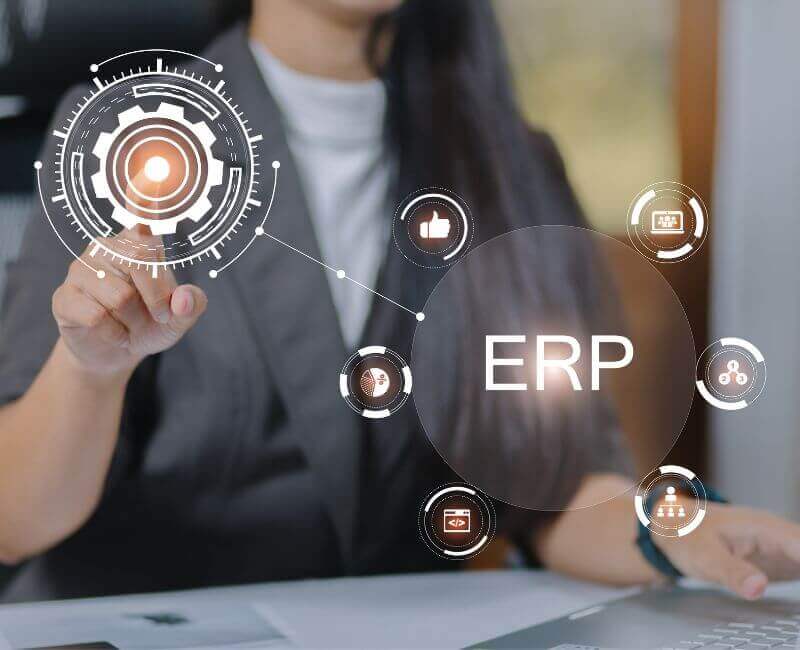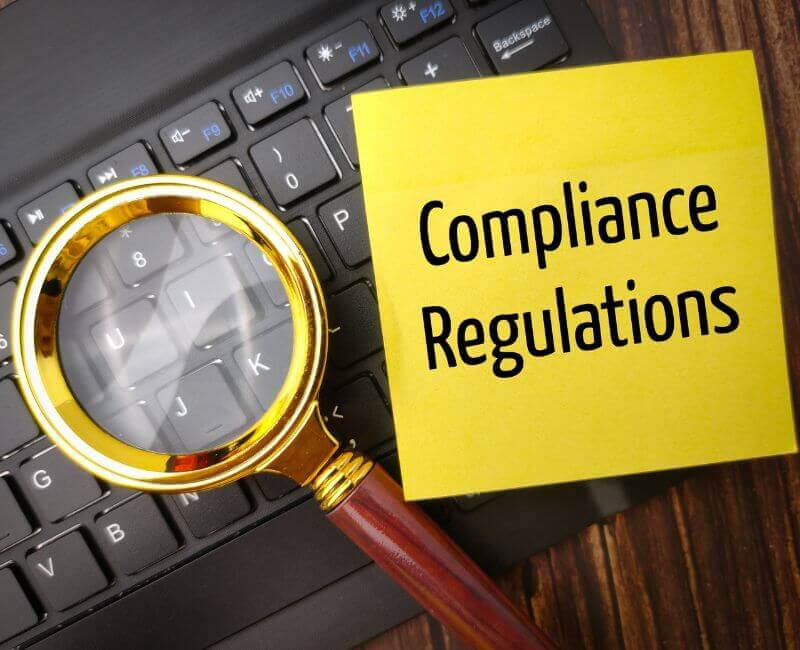What Are ERP Applications?
An ERP (Enterprise Resource Planning) application is a software system designed to integrate and manage various core business processes and functions within an organization. It provides a centralized platform that enables businesses to automate and streamline operations, enhance collaboration, and improve overall efficiency.
ERP Application - Definition & Overview
ERP is an application that helps you to manage key parts of your business operations and automate core business processes.It is used by modern businesses to plan and manage their daily activities. It consists of several modules. Each of them focuses on different business operations.
Using ERP solutions, businesses can automate processes, and get insights into critical data required to make key decisions. They can avoid problems that come with conflicting sources of data, and generate reports in real-time based on authentic information.An ERP is one of the most significant investments for modern businesses. It helps them become self-aware by integrating data from different aspects of the business such as customer support, finance, human resource, inventory, procurement, sales, and more.
Prominent Features of ERP Application
Data Mining
ERP systems offer real-time insights into organizational data. Decision makers can analyze the data patterns, and formulate strategies to reduce costs and improve profitability.
Financial Management
ERP enables businesses to manage their day-to-day accounting and expenditure. It empowers decision-makers to get real-time insights and take quick & informed decisions. It also brings transparency and provides the management higher level of control over expenditure, profitability, and overall business growth.
Market Research & Analytics
ERP lets businesses track sales orders and prepare a comprehensive report over a particular period. They can use this consolidated data to analyze sales trends, perform market research, understand customer behavior, and use various techniques such as cross-selling, to boost sales and grab new opportunities.
Customer Relationship Management
Enterprise Resource Planning can help businesses provide superior customer service by providing all essential information in one place. Customer support agents get instant real-time access to key information such as customer profiles, order history, delivery tracking, complaints, etc.
Business Process Control
ERP makes complex business processes simple and gives you control over business operations. You can monitor and control day to day functioning of your business.
Mobile-friendly
ERPs have evolved a lot with time. Modern ERPs can be accessed remotely using cloud technology. Businesses do not have to invest in large computer networks, infrastructure, and workforce.
Sage X3 Transforming Businesses Globally!
Effortlessly streamline processes and achieve unparalleled business growth

Benefits of Using an ERP Application
1. Reduces Operational Costs
Sage 300 ERP helps businesses turn their focus on reducing operational costs by automating various inventory operations and preventing overstocking & understocking. Its ability to keep track of inventory in real-time, and automatic purchase order generation, helps keep the inventory at optimal levels.
2. Improved Efficiency
Imagine having to look through a lot of physical files to find a small piece of customer information during a phone call. Enterprise Resource Planning ERP eliminates manual tasks and improves efficiency. An ERP can scan a huge dataset for required data, regardless of the department or store.
3. Increases Revenue
The Sales Management System can generate various sales tasks such as lead generation, order processing, etc. By automating these tasks, businesses can close deals faster, efficiently manage various marketing campaigns, expand their customer base, and increase their revenue.
4. Standardizes Manufacturing Process
ERP provides automation, quality control, and consistency throughout the entire manufacturing process. Standardizing the manufacturing process helps improve product quality, gain customer satisfaction, and reduce refund, replacement & warranty costs.
5. Regulatory Compliance
Meeting compliance requirements may not be an easy task. An ERP helps improve regulatory compliance by providing automated workflows, and audit trails, to keep up & stay compliant with the ever-changing government regulations.
6. Brings Transparency
Enterprise Resource Planning provides complete visibility among inter-departmental processes and every aspect of your business. It facilitates access to real-time, authentic information to improve business operations.
7. Centralized Source of Information
An ERP acts as a huge centralized database of organizational information. The data inside this database is constantly delivered to all departments within the company, either through on-premise servers or through the cloud systems.
8. Automates Business Processes & Functions
Enterprise Resource Planning software automates various tasks such as invoice generation, order processing, payroll management, etc. This not only cuts down on time and brings efficiency, but also eliminates duplicate entries and human errors.
Critical ERP Market Statistics
Top Functional Modules of ERP Applications
Production Planning
Production planning is a key challenge for many manufacturing companies. An Enterprise Resource Planning application helps it streamline the entire process right from the beginning with the procurement of raw materials, to the rolling out of the finished products.
Inventory Control
Businesses often face inventory-specific challenges which can affect their liquidity. For example, Excess inventory can cause lower liquidity, higher carrying costs, and higher insurance costs. The Warehouse Management System & Inventory Module in ERP Application helps you deal with these problems.
Sales Management
The Sales Module in the ERP application helps with invoice generation, order placement, order scheduling, and shipping of the product. It maintains a current and historical record of all transactions to forecast sales.
Financial Management
The Financial module in an ERP is beneficial to both profit and non-profit organizations. It helps generate ledgers, cash flows, and payables and provides accounts receivable automation. Businesses can also track financial data regardless of the subsidy company, currency, etc.
Human Resource
The Human Resource module lets businesses build a database of all of their employees, their salaries, attendance, performance evaluation, etc.
Customer Relationship Management
The CRM provides various sales pipeline management features. It makes it easier for businesses to store all customer information — including prospect information, date-time of phone calls and emails, important highlights of past conversations, and purchase history. They can also segment customers into groups for potential cross-sell opportunities.
How to Choose an ERP for Your Business?
Cost of Implementation: It is one of the most important factors. ERP cost will be an initial investment for your business. Module requirements and the number of users are some of the factors that play key roles.
Return on Investment: How worthy is the ERP implementation for your time, money, and efforts? Consider an ERP solution with the highest ROI potential.
Ease of Use: Does the Enterprise Resource Planning software provide a seamless user experience? Does it integrate with other processes and existing solutions? Choose an ERP solution that is easy to use and saves time.
Technology, Reliability & Scalability: Choose an ERP with the quickest response time and access to modern tools (business intelligence, data security & reporting tools). It should be customizable and scalable for your growing needs.
Mobility: Does your ERP offer mobility? If so, it will enable your sales team to work off-site, and record transactions as they occur.
Vendor Viability: How long has the vendor of your ERP been in the market? What is the future roadmap of their software? How many clients actively use their solution?
Best Practices for ERP Application Implementation
Project Team Selection: For successful implementation, build a strong team of workforce with deep knowledge about business processes, and priorities, and has a record of staying on time & budget at all times.
Define Clear Vision & Requirements: Your ERP implementation should align with your business goals. Make sure to draft a clear vision, and requirements so that you can measure the success of your ERP implementation.
Communication: It’s important to communicate with internal and external stakeholders who will be affected by the ERP implementation. Active communication with them will help build trust.
Collect Feedback: ERP implementation can be a complex and challenging task. It has the potential to affect many parts of the business. Be sure to collect feedback throughout the entire process to understand risks and prepare for contingencies.

The Role of ERP in Regulatory Compliance
Regulatory compliance can be defined as a company’s adherence to the rules and regulations established by the Government in the region of business operations. ERP systems make compliance easier in multiple ways:
Access Control Compliances: ERP solution helps companies restrict access to crucial information. They can control permissions to define who can access data and who cannot. The software provides instant visibility when the data is changed.
Quality Control Compliances: ERP software for manufacturing enables companies to set and maintain product quality standards throughout the manufacturing process. This helps them improve traceability, adhere to the quality specifications of the product, and clearly label product ingredients.
Financial Compliance: Financial ERP software increases financial visibility & traceability by maintaining bank reconciliation, accounts receivable, capital management, etc. It collects data on the company’s finances, builds statements (ledgers, Trial Balance, Income Statement), AP Automation, and so on.

ERP Integration: How to Ensure Seamless Data Flow?
ERP integration is the process of consolidating and sharing data with the newly-implemented ERP using various IT-enabled systems.
Point-to-Point Integration: This strategy involves the usage of APIs to serve data without an intermediary. It may also need custom coding by the developers familiar with the APIs.
Middleware: Middleware is a solution that bridges gaps between different tools and enables data transfer from application to application. It works among different application structures and databases.
Microservices: These are small software services that operate independently, and communicate via network technologies. This strategy is commonly used across cloud-based ERP solutions.

Take Your Business Control with Sage X3 ERP
Empower your team and elevate your results with ERP Software
Artificial Intelligence in ERP: The Future of Process Automation
Integrating Artificial Intelligence (AI) into an ERP offers several benefits:
Layout Interpretation & Data Extraction: AI can intelligently detect the layout of different documents such as invoices, sales orders, and debit memos, and extract the relevant data from different fields without manual intervention.
Performance Benefits: Human work requires a lot of time and effort. AI can accurately process a large volume of data in a shorter span of time.
Adapt to Different Environments: The AI integration into an ERP can be scaled up to many use cases, depending on the needs and requirements of the business.
Operational Excellence: AI-integrated ERP analyzes large volumes of data, provides insights, and offers personalized recommendations to achieve operational efficiency. Ultimately, businesses gain a competitive edge.

Get Started with Sage ERP Application
Sage X3 ERP Application is faster, more intuitive, and more tailored business management software. They help businesses of all sizes to embrace change, increase their agility, and proactively react to changing market conditions.
Sage X3 ERP streamline the tasks that need human touch and provide intelligent analytics & reporting to make your business run like a well-oiled machine. Your business will better understand customer needs, and get a competitive advantage.
.
Schedule Product Tour
"*" indicates required fields